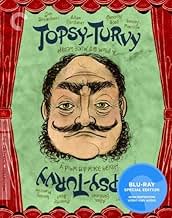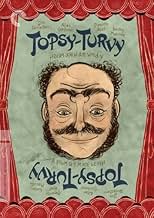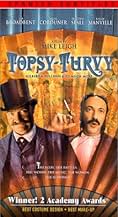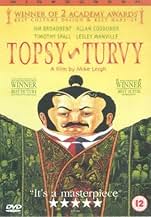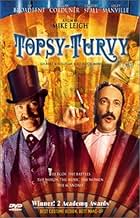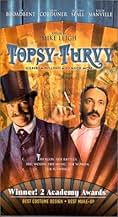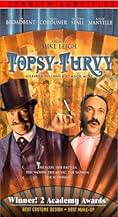VALUTAZIONE IMDb
7,3/10
14.002
LA TUA VALUTAZIONE
Aggiungi una trama nella tua linguaSet in the 1880s, chronicles how during a creative dry spell, the partnership of the legendary musical/theatrical writers Gilbert and Sullivan almost dissolves, before they turn it all aroun... Leggi tuttoSet in the 1880s, chronicles how during a creative dry spell, the partnership of the legendary musical/theatrical writers Gilbert and Sullivan almost dissolves, before they turn it all around and write the Mikado.Set in the 1880s, chronicles how during a creative dry spell, the partnership of the legendary musical/theatrical writers Gilbert and Sullivan almost dissolves, before they turn it all around and write the Mikado.
- Regia
- Sceneggiatura
- Star
- Vincitore di 2 Oscar
- 13 vittorie e 28 candidature totali
Bill Neenan
- Cook
- (as William Neenan)
Recensioni in evidenza
Gilbert and Sullivan are a successful musical team writing their shows for the Savoy Hotel in London. However Sullivan is tired and is suffering from ill-health. During a bad bout he resolves to no longer write for the Savoy with Gilbert but instead to recover in France and then to strike out alone and write a grand opera. Gilbert meanwhile, is showing signs of fatigue coming up with plots that use the same devices to the same ends. However the two are contractually obliged to continue their relationship, a prospect both seem ill at ease with until Gilbert takes an afternoon off at an exhibition of Japanese culture, sowing the seeds of inspiration for The Mikado.
I honestly had never even heard of this film until the television premier in 2002, if you had told me Mike Leigh had made a film on such subject matter I would likely have laughed down my sleeve at such a suggestion. However I gave this a watch despite the fact I know little (or care little) for the works of Gilbert and Sullivan and worries bout the fact it was 160 odd minutes long! However the plot is sufficiently well delivered to take those who only know a little about the pair to keep up. By taking the snapshot of the Mikado to show their relationship the film takes away what could have been a rough, sprawling epic the snapshot works much better. The weaving of the production into the narrative, rather than all at the end, means that both sets of fans will be happy there is enough music to please those who came for that, but also enough plot within to drive the film.
Leigh does very well, mixing humour and telling drama with the music of the show. The production of the film (and the production!) are both very good and the detail is fine. The cast are all excellent. Broadbent is good as the straight-laced Gilbert and his chemistry with the enjoyable Corduner works throughout. The support cast are all good in singing and non-singing scenes I was surprised to see Spall carrying the tunes so well!
Overall this is a good film but I doubt that Gilbert & Sullivan will be much of a draw even now that it is on TV. However if you have the chance to watch it then you should push through your reservations and give it a try it is engaging and humourous enough to overcome a lack of knowledge (or interest) in the pair's work.
I honestly had never even heard of this film until the television premier in 2002, if you had told me Mike Leigh had made a film on such subject matter I would likely have laughed down my sleeve at such a suggestion. However I gave this a watch despite the fact I know little (or care little) for the works of Gilbert and Sullivan and worries bout the fact it was 160 odd minutes long! However the plot is sufficiently well delivered to take those who only know a little about the pair to keep up. By taking the snapshot of the Mikado to show their relationship the film takes away what could have been a rough, sprawling epic the snapshot works much better. The weaving of the production into the narrative, rather than all at the end, means that both sets of fans will be happy there is enough music to please those who came for that, but also enough plot within to drive the film.
Leigh does very well, mixing humour and telling drama with the music of the show. The production of the film (and the production!) are both very good and the detail is fine. The cast are all excellent. Broadbent is good as the straight-laced Gilbert and his chemistry with the enjoyable Corduner works throughout. The support cast are all good in singing and non-singing scenes I was surprised to see Spall carrying the tunes so well!
Overall this is a good film but I doubt that Gilbert & Sullivan will be much of a draw even now that it is on TV. However if you have the chance to watch it then you should push through your reservations and give it a try it is engaging and humourous enough to overcome a lack of knowledge (or interest) in the pair's work.
10markt-9
I loved this film, yet I have a hard time understanding many of the comments other viewers have made. I never liked G&S all that much, thought they were rather light weight stuff. Never liked the late Victorian era much either. Kind of a dull time, I thought. Musicals are definitely not my thing.
Yet this movie struck me as one of the greatest I have ever seen, right up there with Greed and Citizen Kane and all that lot. I suppose it's because I like period pieces, and I think it's damned difficult for anyone to draw an accurate -- or even an evocative -- picture of any time that is not their own. This movie does that, and it never even appears to strain so much as a single hair to do so.
In the end, this movie is deeply *humane.* Like many another Mike Leigh epic, the characters here are drawn in the round, flaws and talents all on view, just like real human beings. And he likes them all, even the stinkers. Likes them well enough to paint them as they are, not as cardboard figures.
If you like your characters pre-digested and redrawn larger than life and your plots full of twists and turns, you might find this movie tame. If you like people, you'll find it fascinating, funny, and true as gold.
And why do I rate it so highly? Because it hangs together so perfectly, all of a piece. It's luscious to look at, delightful to hear, and sweet as candy without ever once becoming saccharine or cheap.
Some reviewers complained you had to "already know" something to enjoy this movie: the music, the time, the language, the whatever. I say, all you have to know is human beings. If you find them interesting, you'll love this movie.
Yet this movie struck me as one of the greatest I have ever seen, right up there with Greed and Citizen Kane and all that lot. I suppose it's because I like period pieces, and I think it's damned difficult for anyone to draw an accurate -- or even an evocative -- picture of any time that is not their own. This movie does that, and it never even appears to strain so much as a single hair to do so.
In the end, this movie is deeply *humane.* Like many another Mike Leigh epic, the characters here are drawn in the round, flaws and talents all on view, just like real human beings. And he likes them all, even the stinkers. Likes them well enough to paint them as they are, not as cardboard figures.
If you like your characters pre-digested and redrawn larger than life and your plots full of twists and turns, you might find this movie tame. If you like people, you'll find it fascinating, funny, and true as gold.
And why do I rate it so highly? Because it hangs together so perfectly, all of a piece. It's luscious to look at, delightful to hear, and sweet as candy without ever once becoming saccharine or cheap.
Some reviewers complained you had to "already know" something to enjoy this movie: the music, the time, the language, the whatever. I say, all you have to know is human beings. If you find them interesting, you'll love this movie.
10Tom-207
I was introduced to Gilbert & Sullivan in my very early teens under the auspices of the parents of one of my friends. They took us to Falmouth on Cape Cod to a place called Highfield, the summer home of the Oberlin College Players. They specialized in G&S and other light operettas.
I learned to appreciate G&S, but I never became a fanatical devotee, even with the historical context patiently explained to me by my friend's mom. (It was similar with Shakespeare. The language could be a barrier rather than a gateway.)
The audience in the theater where I saw Topsy-Turvy was filled with devotees. You could hear their delight as they viewed the actual performances of Gilbert & Sullivan's work in the film. The director, Mike Leigh, through skillful editing and camera work, does an excellent job of photographing a stage presentation, certainly one of the best I've ever seen on film. He uses closeups, and though the actors are using an exaggerated, theatrical style, somehow the G&S material has never been clearer to me; and I've seen at least a dozen G&S performances, including two D'Oyle Carte productions (Pirates and The Mikado), the present-day descendant company of the Savoy Theater depicted in the film. People who have never seen G&S before will appreciate their work here.
Most of all, the film is very much about the highly contrasting personalities of William S. Gilbert and Sir Arthur Sullivan, the former emotionally restrained, the latter a hedonist. Leigh allows us to get to know them quite well and a host of other characters too, though G&S are first among equals in this excellent, ensemble cast. Among the supporting players, I found Shirley Henderson to be increasingly interesting as the film progressed, and I felt rewarded when she was the central character in the last two scenes of the film.
The period settings, manners, and speech are very accurate and detailed. As presented here, the Victorian era seems physically stifling, with people leading their lives in the close quarters of dressing rooms, offices, restaurants, living rooms, and bedrooms. Even more stifling is the emotional inhibition masked by correctly blustery forthrightness. Toward the end of the film, there's a revealing and poignant scene between Gilbert and his wife which makes this all very clear, and what also becomes clear is how important theatrical presentations were to people then as a means of expressing themselves in a culture which sanctioned few quarters to do so. It's one of the best examples of Mike Leigh's direction.
The G&S operettas were, of course, a commentary on Victorian times. In the film, you can see why they were so wildly popular. In that period, I think so many people were so restrained and distant from their own feelings that even the, to us, mannered and wordy G&S operettas were a breath of fresh air in Victorian England. The few occasions when Leigh breaks out of consistently claustrophobic medium shots and closeups are when he gives us a wide view of the full, theatrical stage.
Topsy-Turvy is about how Gilbert and Sullivan refracted Victorian England through a proscenium arch. Mike Leigh refracts it again through the camera lens in a way that allows us to see ourselves in our times by looking at G&S and their operettas in theirs. This is a long film (over two and one half hours), and given the subject matter, not to everyone's interest, though it's far more than the specifics of the period and the material. I found it to be my favorite film of the year thus far, and I highly recommend it.
I learned to appreciate G&S, but I never became a fanatical devotee, even with the historical context patiently explained to me by my friend's mom. (It was similar with Shakespeare. The language could be a barrier rather than a gateway.)
The audience in the theater where I saw Topsy-Turvy was filled with devotees. You could hear their delight as they viewed the actual performances of Gilbert & Sullivan's work in the film. The director, Mike Leigh, through skillful editing and camera work, does an excellent job of photographing a stage presentation, certainly one of the best I've ever seen on film. He uses closeups, and though the actors are using an exaggerated, theatrical style, somehow the G&S material has never been clearer to me; and I've seen at least a dozen G&S performances, including two D'Oyle Carte productions (Pirates and The Mikado), the present-day descendant company of the Savoy Theater depicted in the film. People who have never seen G&S before will appreciate their work here.
Most of all, the film is very much about the highly contrasting personalities of William S. Gilbert and Sir Arthur Sullivan, the former emotionally restrained, the latter a hedonist. Leigh allows us to get to know them quite well and a host of other characters too, though G&S are first among equals in this excellent, ensemble cast. Among the supporting players, I found Shirley Henderson to be increasingly interesting as the film progressed, and I felt rewarded when she was the central character in the last two scenes of the film.
The period settings, manners, and speech are very accurate and detailed. As presented here, the Victorian era seems physically stifling, with people leading their lives in the close quarters of dressing rooms, offices, restaurants, living rooms, and bedrooms. Even more stifling is the emotional inhibition masked by correctly blustery forthrightness. Toward the end of the film, there's a revealing and poignant scene between Gilbert and his wife which makes this all very clear, and what also becomes clear is how important theatrical presentations were to people then as a means of expressing themselves in a culture which sanctioned few quarters to do so. It's one of the best examples of Mike Leigh's direction.
The G&S operettas were, of course, a commentary on Victorian times. In the film, you can see why they were so wildly popular. In that period, I think so many people were so restrained and distant from their own feelings that even the, to us, mannered and wordy G&S operettas were a breath of fresh air in Victorian England. The few occasions when Leigh breaks out of consistently claustrophobic medium shots and closeups are when he gives us a wide view of the full, theatrical stage.
Topsy-Turvy is about how Gilbert and Sullivan refracted Victorian England through a proscenium arch. Mike Leigh refracts it again through the camera lens in a way that allows us to see ourselves in our times by looking at G&S and their operettas in theirs. This is a long film (over two and one half hours), and given the subject matter, not to everyone's interest, though it's far more than the specifics of the period and the material. I found it to be my favorite film of the year thus far, and I highly recommend it.
Not being a big fan of opera (of the comedic variety or otherwise), I chose to watch this movie as a period piece, hoping to see a lot of eccentric characters putting on even more eccentric theatre. That was easy, since the trailer for the film points in that direction entirely.
What I didn't expect was a thoroughly entrancing inside view of the Victorian theatre. Not to mention comprehensive. Everyone is covered in this - from the stage boy through the chorus through the leads and producers and assistant directors. The telling of the complex relationships between the directors (Gilbert and Sullivan) and the leads is particularly poignant - whether dealing with the actors' considerable egos or their individual popularity among the chorus, nothing presented doesn't ring true.
I loved everything about this movie. It's a great story, told wonderfully by all involved. It is truly a film of much love and craft.
And I expect I'll be attending the next run of the Mikado next time it comes to town.
What I didn't expect was a thoroughly entrancing inside view of the Victorian theatre. Not to mention comprehensive. Everyone is covered in this - from the stage boy through the chorus through the leads and producers and assistant directors. The telling of the complex relationships between the directors (Gilbert and Sullivan) and the leads is particularly poignant - whether dealing with the actors' considerable egos or their individual popularity among the chorus, nothing presented doesn't ring true.
I loved everything about this movie. It's a great story, told wonderfully by all involved. It is truly a film of much love and craft.
And I expect I'll be attending the next run of the Mikado next time it comes to town.
Mike Leigh's gloriously entertaining film, `Topsy-Turvy,' offers a wise and witty slice of musical theater history. Set in 1880's London, the movie chronicles the extraordinary personal and professional relationship between two giants of the 19th Century entertainment world, lyricist `Willie' Gilbert and composer Arthur Sullivan. The screenplay, wisely, chooses to pick up the tale not at the very beginning of their collaborative career - tracing its rise and fall as many biopics would do - but rather at the point where the team has already garnered international fame and success but seems of late to be experiencing a bit of creative stagnation. Sullivan, tiring of the seemingly trivial nature of the librettos they've been producing, wants to break away and embark on his own to produce a work of more `weighty' merit. Gilbert, on the other hand, delights in his success and, although bothered by comments in the press that his work has begun to repeat itself, initially resists Sullivan's plea that they abandon their hitherto winning formula.
Thus, the conflict between the two men of creative genius plays itself out against the fascinating backdrop of a deliciously recreated vision of the theatrical world of a hundred-odd years ago. Just as important to the film as the two main characters is the rich assortment of secondary players - theater proprietors, company actors, wives, lovers and parents - who swirl around the principals and provide a colorful tapestry to match the exquisite art direction and costuming that adorn the film. In addition, Leigh incorporates clever references to some of the technological marvels just making their appearance at the time: telephones, reservoir pens and luxury hotels with baths for every room!
Leigh's pacing is admirably unhurried and relaxed. So rich is the detail of his vision that fully thirty-five minutes elapse before the two lead characters even have their first scene together. In addition, the inspiration for `The Mikado' - ostensibly the centerpiece of the film's plot - doesn't strike Gilbert until well into the second hour. Yet, the film never falters in interest, least of all when Leigh devotes long stretches of footage to showing us the actors rehearsing their parts or having us eavesdrop on some behind-the-scenes salary negotiations or discussions of artistic differences. This is the real triumph of the film: Leigh opens up a world to us by letting us see the fascinating nuts-and-bolts aspects of the creative process to which we, as members of a theatre audience, are rarely privy. He also is not afraid to linger long over many a beautiful reproduction of the musical pieces themselves. Leigh can count his film a success in that it makes us want to rush out and catch a performance of one of these operettas ourselves.
The film would not be the splendid success it is were it not for the dazzling performances of its amazingly large cast. Jim Broadbent and Allan Corduner are perfection as the good-natured but often antagonistic partners, never playing the humor too broadly or violating the spirit of elite British gentility even in their most conflict-laden moments.
Indeed, it is this very quality of quiet subtlety that permeates every aspect of `Topsy-Turvy' and that makes it the wholly satisfying and entertaining film it is.
Thus, the conflict between the two men of creative genius plays itself out against the fascinating backdrop of a deliciously recreated vision of the theatrical world of a hundred-odd years ago. Just as important to the film as the two main characters is the rich assortment of secondary players - theater proprietors, company actors, wives, lovers and parents - who swirl around the principals and provide a colorful tapestry to match the exquisite art direction and costuming that adorn the film. In addition, Leigh incorporates clever references to some of the technological marvels just making their appearance at the time: telephones, reservoir pens and luxury hotels with baths for every room!
Leigh's pacing is admirably unhurried and relaxed. So rich is the detail of his vision that fully thirty-five minutes elapse before the two lead characters even have their first scene together. In addition, the inspiration for `The Mikado' - ostensibly the centerpiece of the film's plot - doesn't strike Gilbert until well into the second hour. Yet, the film never falters in interest, least of all when Leigh devotes long stretches of footage to showing us the actors rehearsing their parts or having us eavesdrop on some behind-the-scenes salary negotiations or discussions of artistic differences. This is the real triumph of the film: Leigh opens up a world to us by letting us see the fascinating nuts-and-bolts aspects of the creative process to which we, as members of a theatre audience, are rarely privy. He also is not afraid to linger long over many a beautiful reproduction of the musical pieces themselves. Leigh can count his film a success in that it makes us want to rush out and catch a performance of one of these operettas ourselves.
The film would not be the splendid success it is were it not for the dazzling performances of its amazingly large cast. Jim Broadbent and Allan Corduner are perfection as the good-natured but often antagonistic partners, never playing the humor too broadly or violating the spirit of elite British gentility even in their most conflict-laden moments.
Indeed, it is this very quality of quiet subtlety that permeates every aspect of `Topsy-Turvy' and that makes it the wholly satisfying and entertaining film it is.
Lo sapevi?
- QuizNot only did all the actors do their own singing, but everyone in the cast, including the pit orchestra and the actors who play instruments in the film, actually played the music they are seen to play.
- BlooperThis well known quote from the film is a factual mistake: "If you wish to write a Grand Opera about a prostitute, dying of consumption in a garret, I suggest you contact Mr Ibsen in Oslo. I am sure he will be able to furnish you with something suitably dull". The city of Oslo got the name in 1925 - a long time after Ibsen's death in 1906. During Ibsen's lifetime, the capital of Norway was called Kristiania.
- Citazioni
Helen Lenoir: The more I see of men, the more I admire dogs.
- Curiosità sui creditiThe credit for "Location Vehicles" is misspelled "Location Vechicles".
- Colonne sonoreIf You Give Me Your Attention
from "Princess Ida"
Music by Arthur Sullivan
Lyrics by W.S. Gilbert
Performed by Martin Savage and Chorus
I più visti
Accedi per valutare e creare un elenco di titoli salvati per ottenere consigli personalizzati
- How long is Topsy-Turvy?Powered by Alexa
Dettagli
- Data di uscita
- Paesi di origine
- Lingue
- Celebre anche come
- Topsy-Turvy
- Luoghi delle riprese
- Richmond Theatre, 1 Little Green, Richmond, Greater London, Inghilterra, Regno Unito(Savoy Theatre, London, England, UK)
- Aziende produttrici
- Vedi altri crediti dell’azienda su IMDbPro
Botteghino
- Budget
- 10.000.000 £ (previsto)
- Lordo Stati Uniti e Canada
- 6.208.548 USD
- Fine settimana di apertura Stati Uniti e Canada
- 31.387 USD
- 19 dic 1999
- Lordo in tutto il mondo
- 7.804.439 USD
- Tempo di esecuzione
- 2h 40min(160 min)
- Colore
- Mix di suoni
- Proporzioni
- 1.66 : 1
Contribuisci a questa pagina
Suggerisci una modifica o aggiungi i contenuti mancanti



